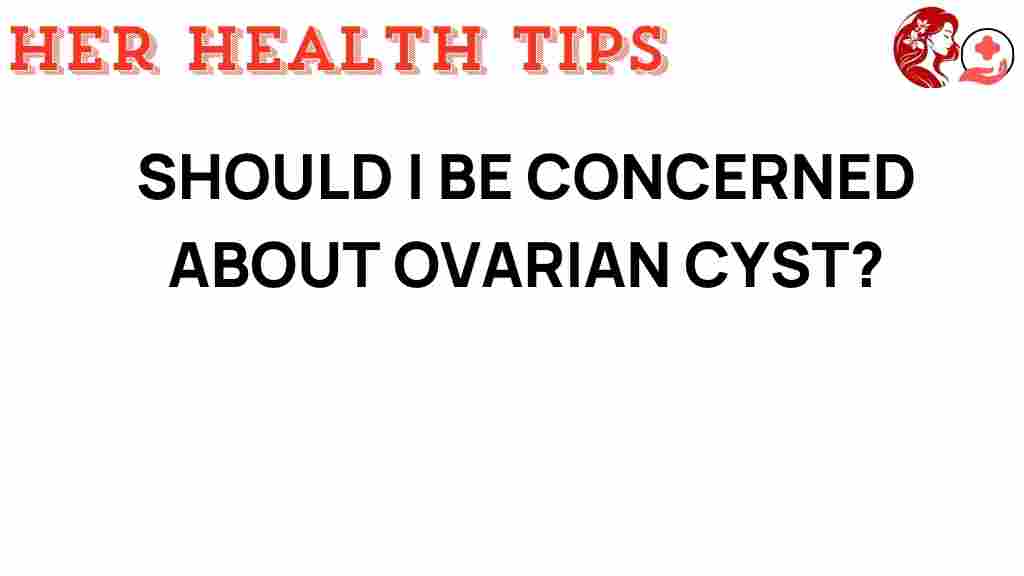Ovarian Cysts: Should You Be Concerned About Your Health?
Ovarian cysts are fluid-filled sacs that develop on the ovaries, and they are a common occurrence in women of reproductive age. While many ovarian cysts are harmless and resolve on their own, there are instances when they can lead to significant health concerns. In this article, we will explore the various aspects of ovarian cysts, including their symptoms, treatment options, risk factors, diagnosis, prevention, and the importance of awareness in women’s health.
Understanding Ovarian Cysts
Ovarian cysts are typically categorized into two types: functional cysts and pathological cysts. Functional cysts are related to the menstrual cycle and usually resolve without treatment. Pathological cysts, on the other hand, can be caused by conditions such as endometriosis or polycystic ovary syndrome (PCOS) and may require medical intervention.
Symptoms of Ovarian Cysts
Many women with ovarian cysts may not experience any symptoms, especially if the cysts are small. However, some symptoms can indicate a larger cyst or complications. Common symptoms include:
- Pelvic pain or discomfort
- Bloating or swelling in the abdomen
- Changes in menstrual cycle
- Pain during intercourse
- Difficulty emptying the bladder or bowel
- Unexplained weight gain
If you experience severe pain, fever, or vomiting, it is crucial to seek immediate medical attention, as these can be symptoms of a ruptured cyst or other serious conditions.
Health Concerns Related to Ovarian Cysts
While many ovarian cysts are benign, there are health concerns that can arise:
- Ruptured Cysts: A cyst may rupture, leading to severe pain and internal bleeding. This condition may require surgical intervention.
- Ovarian torsion: A large cyst can cause the ovary to twist, cutting off its blood supply and causing severe pain.
- Malignancy: Although rare, some cysts can be cancerous, especially in post-menopausal women.
Diagnosis of Ovarian Cysts
Diagnosing ovarian cysts typically involves a combination of a physical examination and imaging tests. Your healthcare provider may conduct the following:
- Pelvic Exam: A routine pelvic exam can reveal the presence of cysts based on the size and tenderness of the ovaries.
- Ultrasound: This imaging test uses sound waves to create a picture of the ovaries and identify the size and type of cyst.
- Blood Tests: Hormonal levels and tumor markers can be evaluated to assess the nature of the cyst.
It is essential to consult with a healthcare provider if you suspect you have ovarian cysts or if you exhibit any concerning symptoms.
Risk Factors for Ovarian Cysts
Several factors can increase the likelihood of developing ovarian cysts:
- Age: Women in their reproductive years are more prone to functional cysts.
- Hormonal Imbalances: Conditions that affect hormone levels, such as PCOS, elevate the risk.
- Endometriosis: This condition is associated with the development of cysts.
- Previous Cysts: A history of ovarian cysts increases the likelihood of future cysts.
Treatment Options for Ovarian Cysts
The treatment for ovarian cysts often depends on their type, size, and symptoms. Here are some common treatment options:
- Watchful Waiting: If the cyst is small and asymptomatic, doctors may recommend monitoring it with periodic ultrasounds.
- Medications: Hormonal contraceptives can help prevent the formation of new cysts and manage symptoms.
- Surgery: In cases of large, persistent, or problematic cysts, surgical options such as laparoscopy or laparotomy may be necessary to remove the cyst or the affected ovary.
Prevention of Ovarian Cysts
While it may not be possible to prevent all ovarian cysts, certain lifestyle choices can help reduce the risk:
- Maintain a healthy weight through diet and exercise.
- Regularly monitor your menstrual cycle and report any significant changes to your healthcare provider.
- Consider hormonal birth control if you are at high risk for cysts, as this can regulate hormonal fluctuations.
Awareness and Education: Key to Women’s Health
Awareness about ovarian cysts is crucial for early diagnosis and treatment. Women should educate themselves about the symptoms and risk factors associated with ovarian cysts. Regular check-ups with healthcare providers can help in early detection and management.
For more information on ovarian health, visit this resource.
Troubleshooting Tips for Managing Ovarian Cysts
If you are diagnosed with ovarian cysts, here are some troubleshooting tips to manage your condition:
- Keep a symptom diary to track any changes in your health or menstrual cycle.
- Communicate openly with your healthcare provider about your symptoms and concerns.
- Consider seeking a second opinion if you feel uncertain about the recommended treatment options.
- Explore support groups or online communities for emotional support and shared experiences.
Conclusion
In conclusion, while ovarian cysts are common and often harmless, they can lead to health concerns that require attention. Understanding the symptoms, risk factors, and treatment options is essential for women’s health. Regular medical check-ups and being aware of your body can empower you to address any health issues promptly.
Remember, knowledge is key. Stay informed about ovarian cysts and advocate for your health by consulting with your healthcare provider when necessary. Awareness and early diagnosis can make a significant difference in managing your health effectively.
This article is in the category Reproductive and created by HerHealthTips Team
